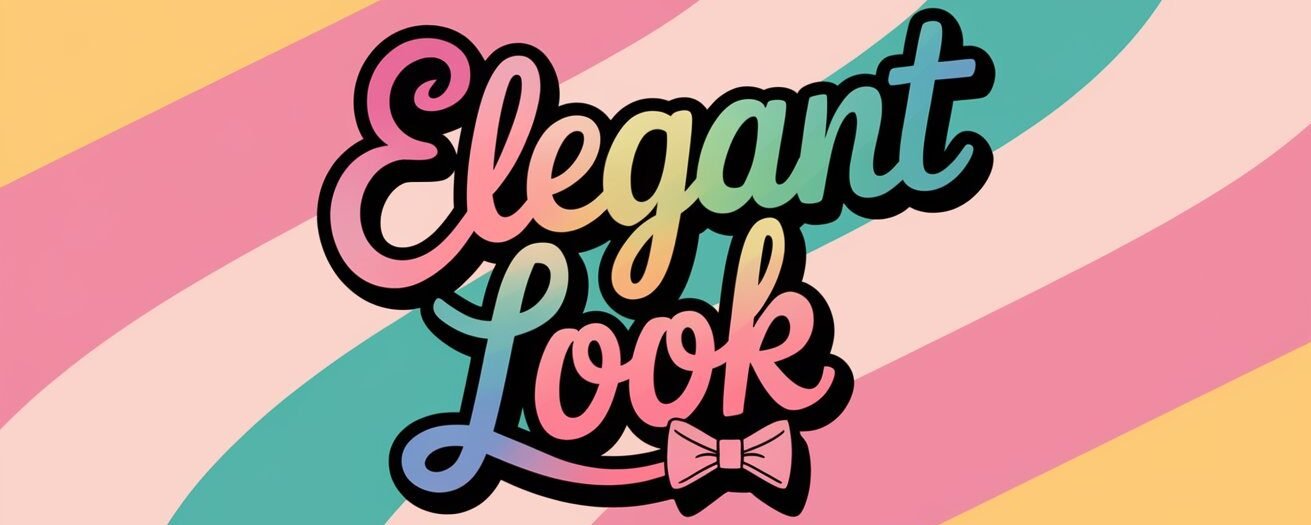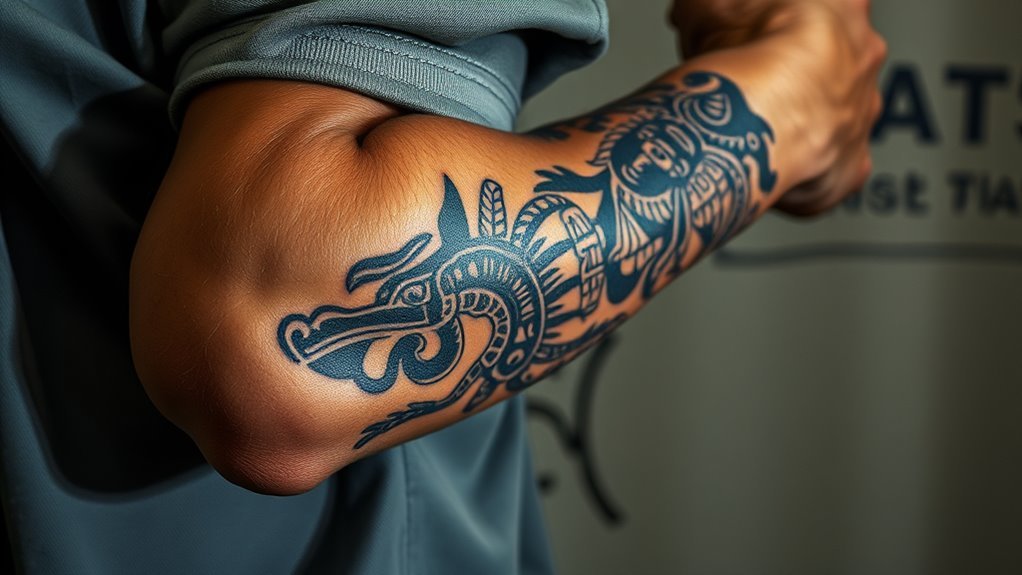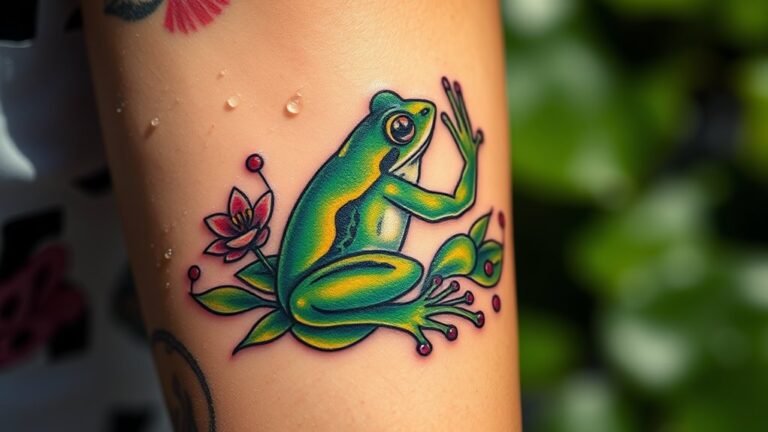Aztec Tattoo Meaning in Prison and Symbolism
When you think about Aztec tattoos in prison, it's easy to overlook their deep-rooted significance. These symbols do more than just adorn skin; they reflect a complex tapestry of identity, resilience, and cultural pride. Inmates often use these tattoos to connect with their heritage and assert a sense of belonging within the harsh realities of prison life. Yet, the meanings behind specific symbols can vary widely, hinting at personal stories and shared struggles. What does it truly mean to wear these marks of honor in such a challenging environment?
In a Nutshell
- Aztec tattoos in prison symbolize cultural heritage, serving as reminders of identity and historical significance for inmates.
- These tattoos often convey loyalty and camaraderie, fostering a sense of community among inmates.
- Common symbols, like the jaguar and feathered serpent, represent strength, bravery, and wisdom, reflecting personal struggles and triumphs.
- Tattoos act as emblems of resilience, connecting individuals to a legacy of survival and courage in difficult environments.
- They promote cultural pride, affirming shared backgrounds and preserving heritage amidst the challenges of incarceration.
Historical Significance of Aztec Tattoos
Aztec tattoos have a rich historical significance that dates back centuries, deeply woven into the fabric of Mesoamerican culture.
These intricate designs weren't just body art; they embodied ancient rituals and conveyed powerful messages. When you wear an Aztec tattoo, you connect with a legacy that represents strength, spirituality, and community.
Each tattoo tells a story, reflecting the cultural significance of the time. They often signified social status or personal achievements, serving as markers of identity and belonging.
Common Aztec Symbols and Their Meanings
Exploring the intricate world of Aztec tattoos reveals a variety of symbols, each loaded with meaning and significance.
Take the sun, for instance; it embodies life and energy, reflecting the importance of light in Aztec mythology. The jaguar symbolizes strength and bravery, often revered for its tribal significance in protecting the community.
Another powerful symbol is the feathered serpent, representing wisdom and the connection between heaven and earth.
Each of these symbols serves not just as an artistic choice but a way to communicate identity and heritage. By choosing these tattoos, you're embracing a deep-rooted cultural narrative that fosters a sense of belonging, drawing upon the rich tapestry of Aztec mythology and its enduring legacy.
Aztec Tattoos and Identity in Prison
While many seek tattoos as a form of self-expression, in prison, Aztec tattoos take on a layered significance that goes beyond mere aesthetics.
You'll find that these intricate designs often represent a connection to heritage, resilience, and belonging within the ink culture.
Here are three key aspects of identity expression through Aztec tattoos in prison:
- Cultural Heritage: They serve as a reminder of the rich history and traditions that connect individuals to their roots.
- Brotherhood: Tattoos can signify loyalty and camaraderie among inmates, creating bonds that transcend the prison walls.
- Personal Identity: Each design reflects personal stories, struggles, and triumphs, allowing individuals to reclaim their narratives in an often oppressive environment.
These tattoos become a powerful emblem of identity and community.
Symbolism of Strength and Resilience
Tattoos inspired by Aztec culture often symbolize strength and resilience, reflecting the deep-seated values of survival and perseverance.
When you wear an Aztec tattoo, you're not just marking your skin; you're embodying a narrative of inner strength that resonates deeply within the prison environment.
Each intricate design, from warriors to gods, serves as a reminder of cultural resilience, honoring those who faced adversity with courage.
This connection to historical struggles fosters a sense of belonging, as you align yourself with a legacy of warriors who triumphed against the odds.
In this way, your tattoo becomes a powerful emblem, inspiring not only you but also those around you, uniting you in shared experiences and collective strength.
Cultural Heritage and Pride
Aztec tattoos serve not only as markers of strength and resilience but also as profound expressions of cultural heritage and pride. For you, these tattoos become a bridge to your roots, connecting you to your ancestors and their stories.
They embody a commitment to cultural identity and heritage preservation, allowing you to reclaim a sense of belonging in a world that often feels disconnected.
Consider these elements of Aztec tattoo significance:
- Symbol of Ancestry: Each design reflects historical lineage, linking you to your forebears.
- Cultural Identity: Tattoos serve as visual affirmations of your heritage, showcasing your unique identity.
- Community Connection: They foster solidarity among those who share your cultural background, reinforcing unity and pride.
Navigating Prison Hierarchies
Understanding the intricate dynamics of prison hierarchies is essential for anyone traversing the complexities of incarceration. In this environment, you'll quickly realize that the prison hierarchy influences daily life and interactions.
Power dynamics dictate relationships, often leading you to align with certain groups for protection and camaraderie. The unwritten rules can be unforgiving; respect is paramount, and understanding the pecking order can mean the difference between acceptance and isolation.
Tattoos, including Aztec symbols, often signify loyalty and status within these structures, further complicating your navigation. By recognizing the power dynamics at play, you can strategically position yourself, fostering connections that offer a sense of belonging while respecting the delicate balance of the prison community.
Personal Stories Behind the Ink
In the world of inked skin, every design tells a story, often filled with deep personal significance. For many, Aztec tattoos symbolize transformative journeys and personal connections formed in the harsh realities of prison life.
These tattoos are more than mere art; they embody experiences, struggles, and aspirations.
- Cultural Identity: Many wear these tattoos to reconnect with their roots, celebrating their heritage.
- Resilience: Each ink mark can symbolize overcoming adversity, serving as a reminder of strength.
- Brotherhood: Sharing similar tattoos fosters a sense of belonging, creating bonds among inmates.
Frequently Asked Questions
How Do Aztec Tattoos Differ Between Various Prison Cultures?
Aztec tattoos reflect deep cultural roots, showcasing unique symbolism across prison cultures. You'll notice variations that emphasize identity and belonging, but be cautious—misusing these symbols risks cultural appropriation, diluting their significance and meaning.
Are There Specific Aztec Designs Considered Taboo in Prison Settings?
In prison settings, certain Aztec designs are considered taboo due to their cultural significance. Choosing these designs could signal disrespect or provoke conflict, so it's essential to understand the implications before committing to your ink.
Can Aztec Tattoos Influence Gang Affiliations in Prison?
Aztec tattoos can considerably influence gang identity, reflecting deep cultural significance. You might find that these designs foster a sense of belonging, connecting you to shared histories, values, and a community within the prison environment.
What Materials Are Used for Aztec Tattoos in Prison?
In prison, you'll find artists using traditional inks made from natural materials, like soot or plant extracts. They'll craft tools from everyday items, turning them into makeshift tattoo machines, blending creativity with survival instincts.
How Do Inmates Choose Their Aztec Tattoo Designs?
You'll find inmates choosing Aztec tattoo designs based on their cultural significance and personal stories. Each symbol reflects their journey, creating a sense of belonging while honoring heritage, making their tattoos deeply meaningful and unique.







